As Pakistan turns 73, Jahangir Mohammed, Director of the Ayaan Institute, looks back at the country’s history of survival against the odds, war and nuclear power status. He argues that the road to the glorious Islamic homeland of its founding fathers will be a long and arduous one, but it is still possible.
On August 14, 1947, the largest mass migration the world had seen led to the creation of the new Muslim state of Pakistan at the end of a 100 years of direct British occupation of India.
India became two countries with Muslims partitioned among them, along with two competing Muslim political visions and ideals.
On the one side was the vision of Dr Allama Mohammed Iqbal and his idea of a separate Islamic state/homeland (the model being the Islamic State at Medina “Riasat Medina”) to protect the Muslims. On the other side was the “composite nationalism” model of co-existence of Islamic scholar Hussain Ahmad Madani.
The odds were stacked against the new state of Pakistan surviving, and certainly not for 73 years. Perhaps Pakistan’s major achievement in this period was its very survival.
It started with many disadvantages – it was not an ethnically/racially homogenous based state, such as Turkey, Iran or many other states created at the end of colonialism. It contained large populations of different ethnic groups who during a century of nationalism were bound to eventually identify and mobilise/solidify politically along ethnic group lines.
The country was also split geographically into East and West with a hostile India in between, which made governance near impractical and separation inevitable. The only unifying factor at the outset was Islam, but here again people were divided deeply along sectarian divisions – Barelwi/Sufi, Deobandi, Shia and later Wahabi/Salafi movements.
So a conflict that was to last 73 years was inbuilt at the birth of the new state. And the Muslims of Kashmir, who at that point mainly wanted to be part of Pakistan, were prevented military from expressing their desire, and looked to Pakistan for support.
Moreover, much of the administrative, governance and military infrastructure experience of local Indians, inherited from the British Raj, rested with the majority Hindu Indian side. Hindus had been preferred in such jobs and empowered during the British occupation.
India subsequently became an ally of the Soviet Union superpower which assisted it with its economic, political and military development. However, it also meant that the USA, the other superpower, would ensure Pakistan remained in its sphere of influence, without providing the development necessary for its survival, for which Pakistan gradually became reliant on China.
So Pakistan had to create its own political and military structures, if not entirely from scratch but from a low starting point.
Whilst the vision of an Islamic state along the Medina model was inspiring, there was no one with the practical political experience and knowledge to turn it into a reality at that time.
The British had done a great job of destroying traditional Islamic educational and religious institutions and the vision of Iqbal became translated practically and politically into a secular nationalist expression. In fact, the vision of Iqbal was later to inspire Farsi-speaking revolutionaries like Dr Ali Shariati and the Ayatollahs in Iran, more than it did the Urdu speaking leaders/scholars of Pakistan.
73 years of war and conflict
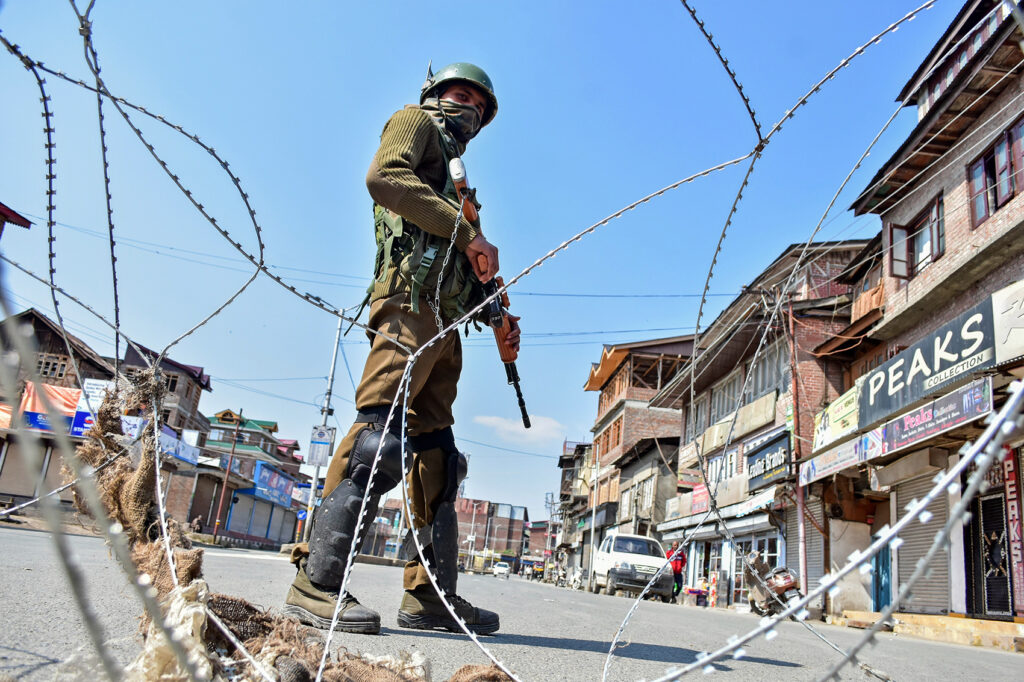
A strong centralised state and military was always going to be necessary to hold the country together. That was obvious from the early decades.
In the past 41 years Pakistan has been the focal point for superpower wars and has been on a war footing for most of its existence. The consequence of this state of war has been that Pakistan has become a powerful and experienced militarised state and a nuclear power.
The country’s history started with a war with India over Kashmir in 1947, and further wars over Kashmir in 1965 and 1999.
In between a failed political and military policy in the East of the country led to a disastrous war with the independence movement that had emerged there, leading to defeat to India, the loss of East Pakistan and the creation of the new Muslim state of Bangladesh.
In 1979, a pro-India Soviet Union invaded and occupied Pakistan’s neighbour on its other side, Afghanistan. A successful invasion would have meant Pakistan would inevitably be next in line and encircled by hostile forces on both its borders. The U.S. and West were not going to let that happen and Pakistan (along with the West) supported the mujahideen in Afghanistan and it became the key state in a struggle between global superpowers.
But Pakistan not only survived the 1979 Soviet Union invasion of Afghanistan, it helped reverse it and bring an end to the Soviet occupation in 1989. Consequently, Pakistan hosted millions of Afghani refugees and were left to manage them, as well as the jihadi infrastructure and thousands of fighters and their leaders from all over the world whose host countries mostly did not want them back, as well as a bitter factional civil war in Afghanistan fuelled by different countries.
Pakistan backed what it saw as the “stability option” in Afghanistan supporting the majority ethnic Pashtun Taliban into power in 1996. And both countries got caught up in a tit-for-tat revenge game between Osama Bin Laden and his fighters and the USA.
On September 11, 2001, Pakistan got caught up in an attack on the USA by supporters of Bin Laden and became the focus for another global war, the “War on Terror.” The Pakistani military sided with the U.S. and the West, using it also as an opportunity to remove the fighters left over after the jihad against the Soviet Union from its soil.
The emergence of the Pakistani Taliban and its violence inside Pakistan created havoc in the country. Pakistan’s participation in the War on Terror was at great loss to itself and damaged its standing globally among Muslims and Western countries.
Meanwhile, on the home front an ethnic Mohajir movement, the MQM (those who had migrated from India), complained of political discrimination and threatened secession from Pakistan in and around the Karachi area, fuelling violence and disorder.
Economic and political power
Whist Pakistan has become a modern military power, the consequence of that has been that its civil society, government, educational institutions, and economic development have fallen far behind.
The focus on military survival has allowed a corrupt politics to emerge and enabled large-scale theft of public money. And its politics has drifted between military rule and mostly family-based politics and government during its 73 years.
Moreover, aside from the defeat of the Soviet Union in Afghanistan, the achievement of Pakistan’s political objectives through use of warfare (direct and indirect) have been largely unsuccessful. It was defeated by India in 1971 and Kashmir has now been annexed by India; Afghanistan remains unstable and is now more pro-India; the “War on Terror” has simply fuelled Pashtun anger; and a push for separatism has emerged in Baluchistan and the Frontier regions.
In the coming decades Pakistan will have to focus on building its infrastructure, educational system, cleaning up its politics and realigning with its founding vision, whilst developing its natural resource base and tourism industries.
It will also have to find non-military solutions to the problems of Kashmir and Afghanistan, and ways of dealing with the rise of a Hindutva fascist India.
The United States and the West have also now fully gravitated and allied with India in a new emerging capitalist bloc against the latest superpower China. Pakistan, on the other hand, has moved closer towards its most loyal supporter during much of its existence, Communist China. The new superpower struggle between the USA and China will inevitably mean that Pakistan will remain a focus for superpower politics, rivalry, and military conflicts. In that sense Pakistan will have to continue to develop its military power and deal with more conflicts.
No Muslim state in the contemporary age can be deemed independent unless it becomes militarily, economically and politically strong and powerful and withstand external pressure.
The Pakistani state has survived 73 years in a period where others such as the Soviet Union, Eastern European States and Muslims states have not. That of itself is an achievement.
However, for Pakistan the road to independence and Medina is likely to be long and arduous one. If Pakistan can develop economically and politically, free of war and conflict, for the next couple of decades it may well yet reach its destination and emerge as a political and economic power in the region.
How has Imran Khan performed in his first year as Pakistani PM?
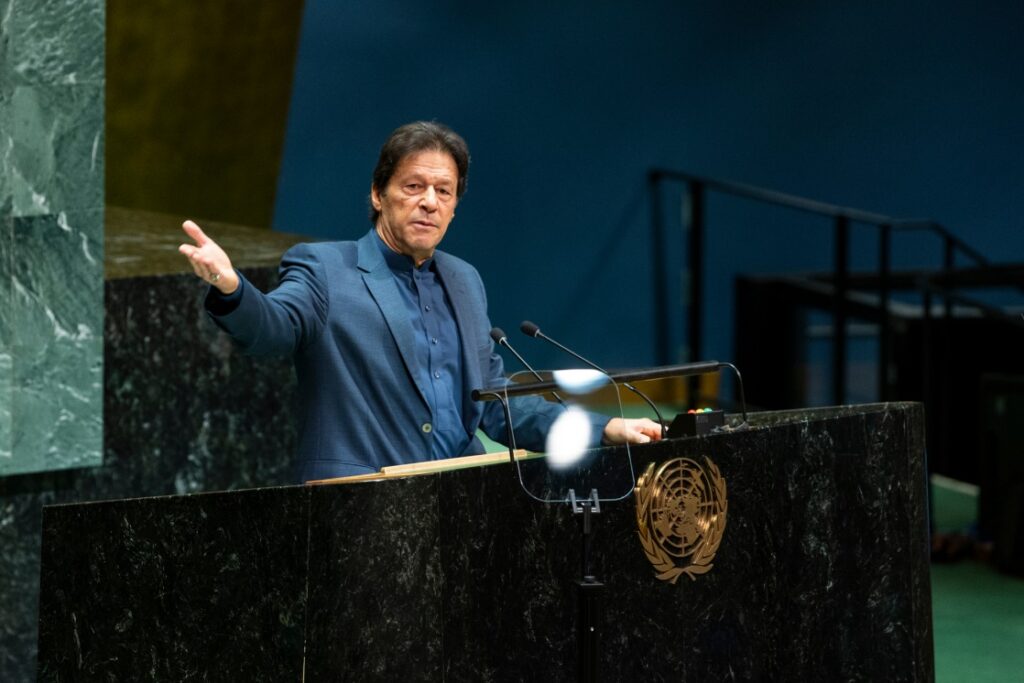 Jahangir Mohammed, Director of the Ayaan Institute says in the first year of his administration Imran Khan has yet to show any major signs of progress, but that may be because of huge opposition forces and vested interests opposed to any change.
Jahangir Mohammed, Director of the Ayaan Institute says in the first year of his administration Imran Khan has yet to show any major signs of progress, but that may be because of huge opposition forces and vested interests opposed to any change.
A year ago Pakistan elected a new Prime Minister, Imran Khan, after prolonged periods of corrupt dynastic family and military rule.
Khan’s convincing electoral victory led Pakistanis at home and overseas to sing “tabdeeli (change) is coming.” His Pakistan Tehreek -e-Insaaaf (PTI) had created a popular movement aiming to end political corruption, exit the “War on Terror,” and meet the needs of the poor.
A populist movement like this had not been seen in Pakistan since the 1970s when Zulfiqar Ali Bhutto emerged in Pakistani politics with his socialist slogan of “Roti Kapra Makaan” (food clothing housing).
Imran Khan had come a long way from being a political novice to an experienced political campaigner. Despite accusations of being a “puppet” of the military, no impartial observer can deny that he had worked tirelessly for over a decade to win over the Pakistani people.
Whilst nobody expected PM Khan to change Pakistan in 12 months, let’s assess his performance against his promises in his first year.
But I must say that one of the challenges of assessing his performance is navigating the exceptional amount of propaganda and fake news about him since he came to power. This comes from a variety of opponents, primarily the old order and their media friends but also Islamic activists linked to the old guard, or those envious of his support from the masses and his rise to power.
It was also inevitable after decades of a corrupt politics leading to a corrupt culture in Pakistan that there would be fierce resistance to change. Many in his own party had previously been part of the other parties, and I am informed some are as resistant to change as those outside the PTI.
International debt and self-sufficiency
On assuming office, it became clear that Pakistan was facing a balance of payments/foreign reserves crisis. In fact, the government may not have survived or would have been unable to pay its debts and manage the economy without further international loans.
Imran Khan tried to avoid another IMF bailout and went on a mission to Muslim countries to ask them for assistance. He was successful in raising around half of the 12bn dollars of investment that was needed from countries such as Saudi Arabia, the UAE and others.
However, he still ended up taking out an IMF loan of $6bn. The IMF, however, notes that Pakistan has started a positive programme of policy reforms. Khan has also managed to persuade the USA to reinstate around $800 million of aid it had withdrawn when he came to power.
Whilst this assists Pakistan in the immediate term, it means that Pakistan is now indebted to a number of dynastic Gulf rulers as well as the IMF, USA and China. So it comes at a price of having to implement their policies and conditions, high interest repayments, and confines Pakistan to being a dependent state for the foreseeable future.
The consequence of the time it took to plug the gap in foreign reserves through loans and the effects of austerity measures kicking in has meant that inflation is now the highest it has been for five years at 10.3%, and the Pakistani rupee has devalued to around $160.
This is undoubtedly causing hardship for the poor and leading to vocal noises from the middle and upper classes who are in fact less affected than they complain.
Tackling corruption
A major campaign pledge of the PTI was cleaning up government, tackling corruption and recovering stolen wealth from former political party leaders and government officials, much of which is stashed or invested overseas.
At a personal level Khan has set an example by reducing the costs of his government, including PM residences and travelling expenses and putting government buildings to economic use. Very few in Pakistan doubt Imran Khan’s honesty and integrity compared to previous leaders of the country.
He has also set about arresting the alleged fraudsters and started the process of identifying their misdemeanours and assets, whilst negotiating with those countries where proceeds of corruption are stashed.
However, major recovery of laundered money – which it is claimed would have a major impact on debt repayments – has yet to be seen.
Unfortunately, corruption and bribery have become endemic in Pakistani society, and only a major educational programme starting at school, inculcating Islamic values and principles, can properly address this issue at its roots.
Increasing tax revenue and land reclamation
Very few people in Pakistan pay direct taxes so indirect taxes tend to be imposed which mainly affect the poor.
Increasing the income base of Government to provide essential welfare services and repay debts was essential to the PTI programme. But everyone from private doctors/consultants, lawyers, big property owners to businesses, media outlets and journalists avoid paying tax in Pakistan. And a great deal of resistance from tax avoiders is reflected in social media hate and comments directed at Imran Khan.
So whilst around 25,000 new people have been brought into the tax net, and a scheme for self-assessment is being proposed, increasing the tax base will remain a major challenge for the government.
Private individuals have also encroached on or built on land which is not theirs. Some action against those who have built or taken over stolen land has commenced and is unpopular.
War and peace
Imran Khan has been the most vocal opponent of the U.S.-led “War on Terror” in Pakistan.
His view that there could only be a political solution to the war in Afghanistan and the Kashmir issue has now been widely accepted at home and abroad. He has made it clear that Pakistan will never again fight other people’s wars but will be a “partner for peace.”
On the Afghanistan front, progress is being made on negotiations between the Pashtun resistance groups and the USA which Pakistan has been mediating, and a political settlement is expected in the near future. Khan’s firm stance on this issue has had an impact internationally and has brought some relief on the domestic terrorism front.
However, Khan’s constant protestations about peace, political settlements and international dialogue have been seized on as a weakness by the military ideologues of the RSS and the BJP rulers of India.
The Pulwama incident was a test by India to see how prepared Pakistan was for military action on the Kashmir front. Khan is generally perceived in Pakistan to have done well on the response to and handling of Pulwama, portraying Pakistan as a responsible nuclear state.
However, with the annexation of Jammu and Kashmir by India recently, and the anticipation that Azad Kashmir is next for attack, getting rid of Indian agencies in Afghanistan, Baluchistan and Kashmir will be a major challenge in the coming year.
Khan personally seems convinced that his policies of talking to other nations and international agencies will resolves military and political issues. He also appears to have developed cordial relationships with many leaders and countries.
Only time will tell if his diplomatic approach will work. Most powerful states these days tend not to fight wars against each other, nor do they rely on the UN. Instead, they use proxy paramilitary groups, sub-contractors and an array of local political groups/allies. It remains to be seen how Pakistan will respond on this military challenge.
On other international issues affecting Muslims, Khan has been rightly criticised for his silence on China’s treatment of Uyghur Muslims. People understand Pakistan’s intimate relationship with China and that it’s CPEC project is important, however they expect better from someone who claims to want to establish a “Madina riasat” and is otherwise an outspoken individual.
Release of Pakistani prisoners
Many Pakistanis are imprisoned overseas, sometimes for no apparent crime as in the Gulf States. In other places some are political prisoners or victims of injustices.
Khan has long championed the case of Dr. Afia Siddiqui imprisoned in the USA, and whilst there appears to be a willingness to release her she has still not been released.
Khan was however successful in pleading the case for the release of Pakistanis held in prison in Saudi Arabia and over 2,000 prisoners were pardoned by Prince Salman.
But in Pakistan disappeared individuals or political prisoners are still being held. Khan’s promises of due process and rule of law remain just that, and no process or procedure has been established to identify those people and to revisit their cases.
Khan needs to establish a Judicial Commission which can identify and examine claims of families whose loved ones are missing or who are being held for no apparent crime.
Medina Riasat?
Khan has constantly referred to the state of Medina established by our Prophet (peace be upon him) as being his ultimate vision. At other times he confuses this for a modern European style welfare state, as well as with the vision of Mohammed Ali Jinnah.
It is not clear if this is just rhetoric, or whether he understands what that state was and how to get there. No Medina state has ever been introduced through a secular democracy.
If he is serious about this, he needs to appoint a council of wise Ulama and committed Islamic intellectuals who should map out how to transition Pakistani society and its institutions to the Madina model.
Khan has also set out plans to mainstream the Madrassahs in Pakistan into a state-funded Islamic educational system. This has been one of his least talked-about policies, but one if successfully implemented could develop into a free system of education for all.
He has also started to discuss plans for social housing for the poor. Other welfare reforms are not on the horizons.
So in the first 12 months of his administration, PM Khan has yet to show any major signs of progress and has had huge opposition from forces opposed to change. However, he has planted some of the seeds of change that he promised.
It remains to be seen if the powerful forces of the status quo will allow him to change the system.
Reconquista: Jammu and Kashmir under direct Hindutva supremacist rule
The Hindutva “reconquest” of Jammu and Kashmir has begun, and the subcontinent’s Muslims now face a powerful and fascist India, writes Jahangir Mohammed, Director of the Ayaan Institute.
On the 5th of August, the Indian Parliament repealed Article’s 370 and 35A of the Indian constitution, which granted Jammu and Kashmir (JK) a special status. These laws have been in place since 1949, confirming JK as an accession state, giving hope to the people of the region that they would one day be given the right to self-determination. JK had the ability to have its own flag, own constitution and assembly, and determine its own laws. Article 35A also prohibited those outside of Kashmir from purchasing property and taking residency in JK so the Muslim majority demographic could not be altered by a huge Hindu population in India.
Article 370 provided some smokescreen of autonomy to JK and allowed its politicians to nurture relationships with India. The belief was that through this arrangement JK would become a permanent part of India. The “special status” was a myth. The region has never been free of Indian military control, but it allowed India to claim JK was “Indian administered” rather than Indian occupied – the latter being the reality. With the repeal of these articles and the arrest of Kashmiri leaders, the notion of an “Indian administered” Kashmir is dead. India has made JK part of India by force. JK is now officially occupied by India, in violation of the Indian constitution, the JK constitution and UN resolutions.
Why has India acted now?
At partition of India, JK leaders and some Muslim leaders in India, had pro Indian nationalist sentiments, and a deeply held belief that it was better for Muslims to be part of a united India. They believed that a secular democracy would grant Muslims their rights and protection. The view of the two-state Pakistan Movement was that Hindu majority rule would ultimately lead to Hindu dominance and oppression, and that Muslims could only be safe in a separate Muslim majority state. When it came to Kashmir, an autonomous Princely State, a Muslim majority population were prevented from choosing to become part of India or Pakistan, or remaining independent, by its Hindu ruler, Maharaja Hari Singh, who was pro India and signed a treaty with India. After two wars between India and Pakistan, with Chinese involvement, Kashmir became partitioned. China took the Aksai Chin region and Pakistan controlled what became Azad (free) Kashmir whilst India maintained control of Jammu Kashmir including the Buddhist region of Ladakh.
India had always hoped that with economic success, the majority Kashmiri Muslims would become pro India at some point, a referendum could then be held (in accordance with United Nations resolutions) and India would be chosen. However, over time this has not happened and Kashmiri masses unlike many of its leaders have inclined towards Pakistan or increasingly independence.
Uprisings for freedom by Kashmiri’s in 1987 led to direct military occupation of the region by up to 500,000 Indian troops, now 32 years on. During this time, nearly 100,000 Kashmiri’s have been killed, thousands raped or tortured, and held without due process as political prisoners.
The latest uprising among Kashmiri youth started three years ago with the death of resistance leader Burhan Wani in July 2016. It has led to thousands of Kashmiris being blinded by Indian troops firing pellets. This makes a mockery of the notion that JK is being “administered” and not militarily occupied by India.
The spirit unleashed by a young Kashmiri population demonstrating for freedom from India, has showed no signs of ending. With a Hindutva fascist movement and government in India (with Muslims in India also being a target of anti-Muslim hatred), there was no prospect that the Kashmiri people would ever become part of India by choice. So, the BJP rulers decided to make Kashmir part of Hindutva rule by force and change its demographics, so it will no longer be a majority Muslim region.
The rise of Hindutva fascist India – A global challenge
 At the heart of the problem for Muslims in India, Kashmir, Pakistan and the rest of the world is the rise of a virulent Hindutva (‘Hinduness’) supremacist political and religious ideology that now rules India. Its political wing, the BJP has been democratically elected twice and is becoming stronger every day. Its paramilitary wing, the RSS (Rastriya Svayamsevaka Saṅgha), of which Modi was a member, has permeated all facets of Indian society. The RSS has done this as leader of a large body of organisations called the Sangh Parivar (the “family of the RSS”). This includes the Vishva Hindu Parishad (VHP, World Hindu Council) a militant organisation which promotes Hinduisation of India, the Hindu Sena (Army of Hindus) and Shiv Sena (Army of Shivaji). The BJP is now the largest political party in the world whilst the umbrella RSS is the largest social voluntary organisation in the world. The RSS was banned under British rule and by early independence Indian governments.
At the heart of the problem for Muslims in India, Kashmir, Pakistan and the rest of the world is the rise of a virulent Hindutva (‘Hinduness’) supremacist political and religious ideology that now rules India. Its political wing, the BJP has been democratically elected twice and is becoming stronger every day. Its paramilitary wing, the RSS (Rastriya Svayamsevaka Saṅgha), of which Modi was a member, has permeated all facets of Indian society. The RSS has done this as leader of a large body of organisations called the Sangh Parivar (the “family of the RSS”). This includes the Vishva Hindu Parishad (VHP, World Hindu Council) a militant organisation which promotes Hinduisation of India, the Hindu Sena (Army of Hindus) and Shiv Sena (Army of Shivaji). The BJP is now the largest political party in the world whilst the umbrella RSS is the largest social voluntary organisation in the world. The RSS was banned under British rule and by early independence Indian governments.
Hindutva supremacist ideology seeks to create a Hindu identity society by restore Hindu rule, by cleansing India of what it considers foreign alien elements; including Muslims and Christians, their culture, language, heritage, religious beliefs and places of worship. It seeks a return India to its pre-Muslim times, including the forced conversion of Muslims to their pre-Muslim Hindu beliefs. For the last decade at least, this propaganda has been pumped out at all levels of mainstream Indian society.
The problem for Muslims of Kashmir and Pakistan is that the re-conquest of land is also an integral part of the Hindutva vision. It views the historical Indus valley/river civilisation as part of Hindu India. The historical centres of this civilisation are claimed to be Mohen je daro and Harappa in Pakistan. Whilst in Kashmir, the priestly Kashmiri Hindu Pandit caste (or Kashmiri Brahmins) claim to have a pre-Muslim historical claim and pre-independence right as Hindu rulers with Muslim subjects.
In the context of the rise of this Hindu supremacist ideology, the forced integration of Kashmir into “Hindu rule” in India was inevitable. What happened a few days ago will be viewed by the Hindu supremacists through the lens of a ‘Hindu Reconquista’ of Kashmir.
Pakistan and Imran Khan’s miscalculations
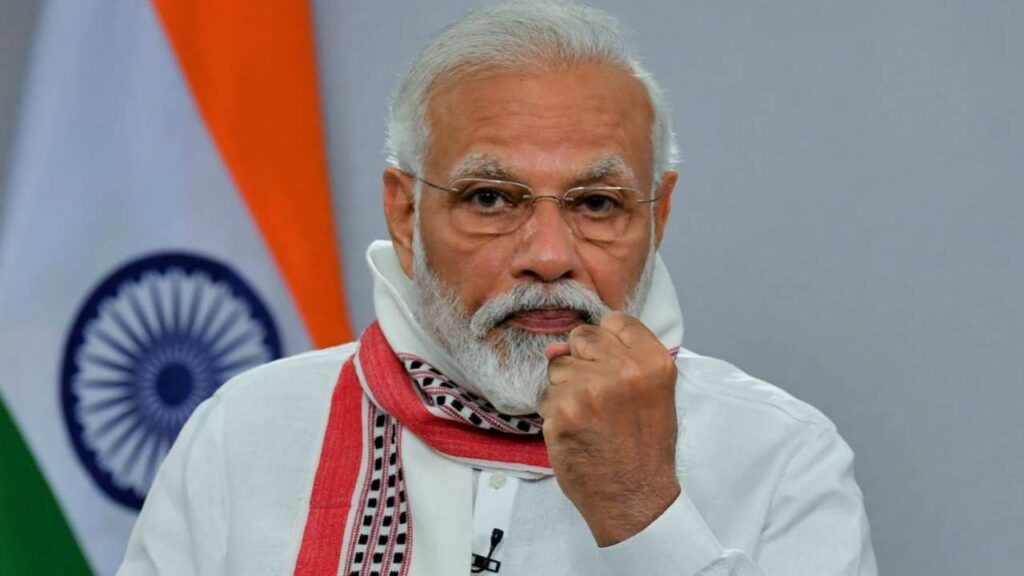 Whilst the BJP government has made the current move for its own ideological reasons, the decision has been calculated at a time when Pakistan is politically and economically weak and dependent on debt finance. Not just from the IMF, but more importantly from Saudi Arabia and the UAE, who Modi has successfully courted. Any reaction from Pakistan will be curtailed by pro-Modi Gulf rulers whose economies are being managed mainly by Hindu Indian businessmen and workers.
Whilst the BJP government has made the current move for its own ideological reasons, the decision has been calculated at a time when Pakistan is politically and economically weak and dependent on debt finance. Not just from the IMF, but more importantly from Saudi Arabia and the UAE, who Modi has successfully courted. Any reaction from Pakistan will be curtailed by pro-Modi Gulf rulers whose economies are being managed mainly by Hindu Indian businessmen and workers.
It also comes at a time when Pakistan’s political leader, Prime Minister Imran Khan, has made a major plank of his government’s policy, anti-war, pro-peace, and political settlement of conflicts and disputes. Peace is a noble human goal, but you have to understand the psychology of the enemy you’re dealing with.
His constant talk of peace, to try and shed the image of Pakistan as a “terrorist supporting” state, was bound to be seen as a weakness by the militant Hindutva ideologues in India who are prepared to achieve their political goals militarily. As such it was short-sighted. His constant appeals to international diplomacy and settlement are also a miscalculation about the realities of achieving peace through international agencies and the US – another sign of undeniable weakness.
Practically, Pakistan will be unable to act, and may have to accept as a reality that Jammu Kashmir is part of India, which would mean that de facto Azad Kashmir would become part of Pakistan, unless India decides to take that too. Temporary lines of control have a habit of becoming permanent. This would be the very betrayal that Kashmiris have long predicted.
The people of both sides of Kashmir will be unhappy with such an arrangement, and the Kashmiri quest for self-determination and resistance will continue, regardless of what India or Pakistan do or don’t do.
Of all the conflicts affecting the Muslim Ummah, the Kashmiri cause has been the most neglected by Muslim activists and masses. What is now required for the rest of the Muslim masses is to stand with the Kashmiri people and against the rise of Hindutva fascist rule, if only in their own interests. The rise of Hindutva fascism will affect many Muslims around the world, and silence is no longer an option.
Article first published on 5Pillars
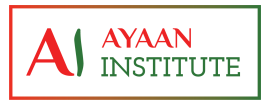

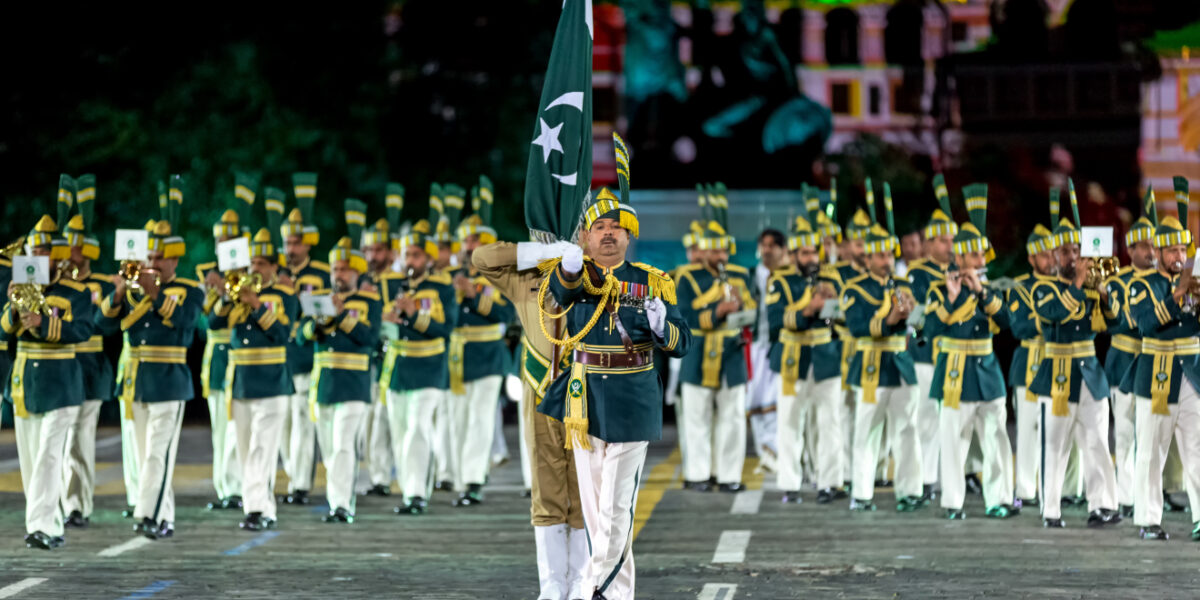
Leave a Reply